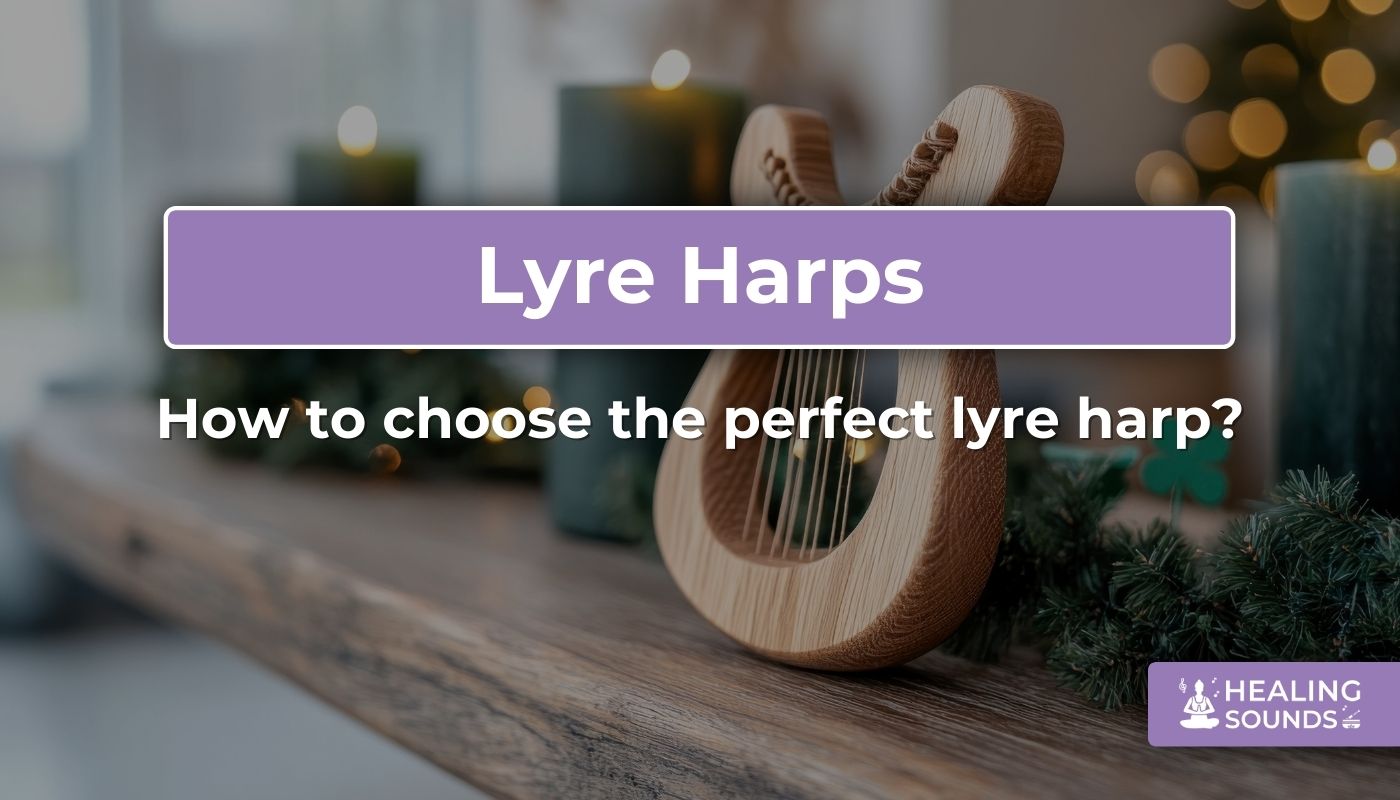Trouver la harpe lyre idéale peut être passionnant, mais peut-être un peu intimidant face aux nombreuses options disponibles. Mais pas d'inquiétude ! Comprendre cet instrument enchanteur transforme le processus de sélection, complexe et captivant. Une harpe lyre, c'est bien plus que des cordes et du bois ; c'est le véhicule de belles mélodies qui peuvent apporter sérénité et harmonie à votre vie. Chez Healing Sounds, nous avons à cœur de vous proposer des instruments de haute qualité offrant des expériences musicales sereines et sonores. Que vous soyez un débutant curieux faisant ses premiers pas dans la musique ou un musicien intermédiaire en quête d'un nouveau son, apprendre à choisir la harpe lyre parfaite est essentiel. Ce guide vous présente les facteurs essentiels à prendre en compte pour vous aider à faire un choix éclairé, en harmonie avec vos aspirations et vos besoins musicaux.
Pourquoi choisir une harpe lyre ?
La harpe-lyre possède un charme unique, distinct des autres instruments à cordes. Son histoire remonte à l'Antiquité, souvent associée aux contes, à la poésie et aux moments de recueillement. Pour les amateurs de musique moderne, notamment ceux attirés par les sons apaisants ou la sonothérapie, la lyre offre une porte d'entrée accessible. Son accordage typiquement diatonique permet de créer facilement des harmonies agréables, faisant de la harpe-lyre un excellent choix pour les débutants . Ses sonorités douces et éthérées sont également idéales pour la relaxation, la méditation et l'exploration du potentiel thérapeutique de la musique.
Facteurs clés dans votre guide d'achat de harpe-lyre
Choisir la meilleure harpe-lyre implique de trouver le juste équilibre entre plusieurs éléments. Découvrez les critères à prendre en compte dans ce guide d'achat essentiel.
Nombre de chaînes : simplicité ou portée
Le nombre de cordes influence considérablement la tessiture et la complexité musicale de la lyre. Les harpes-lyres courantes comptent de 7 cordes à 24 cordes, voire plus.
- Moins de cordes (par exemple, 7 à 16) : Ces instruments sont souvent plus faciles à manier pour les débutants. Ils sont généralement plus légers, plus portables et moins intimidants à apprendre. Une harpe lyre à 16 cordes est un bon point de départ. Bien que leur tessiture soit limitée, ils sont parfaits pour les mélodies et l'accompagnement simples.
- Plus de cordes (par exemple, 17-24+) : Offrent une gamme de notes plus large, permettant des morceaux plus complexes et de plus grandes possibilités harmoniques. Des instruments comme une harpe lyre à 17 ou 24 cordes offrent une plus grande polyvalence à mesure que vous progressez.
Tenez compte de vos objectifs musicaux. Si la simplicité et la portabilité sont essentielles, commencez par un modèle plus petit. Si vous envisagez de jouer une musique plus complexe, un nombre de cordes plus élevé pourrait être préférable à long terme.
Les matériaux comptent : types de bois et qualité sonore
Le bois utilisé pour la fabrication du corps de la harpe-lyre est essentiel à sa sonorité et à sa longévité. Des bois de résonance comme l'acajou, le palissandre, l'érable ou l'épicéa sont souvent choisis pour leurs propriétés acoustiques.
Le bois massif de haute qualité produit généralement un son plus riche et plus résonnant, tout en garantissant une longue durée de vie . Les bois stratifiés peuvent être plus économiques et plus stables face aux variations d'humidité, mais peuvent offrir une profondeur acoustique moindre. Lorsque vous choisissez une harpe lyre , examinez attentivement la finition et tenez compte du savoir-faire : cela influence à la fois le son et la durée de vie de l'instrument.
Types de cordes : nylon, boyau ou acier ?
Les cordes sont la voix de votre harpe-lyre. Le matériau influence le son, le volume et la sensation.
- Cordes en nylon : Courantes sur de nombreuses lyres modernes, notamment les modèles pour débutants. Elles produisent un son chaud et moelleux et sont généralement plus douces au toucher.
- Cordes en boyau : Offrent un son traditionnel, riche et complexe, souvent privilégié pour la musique historique. Elles peuvent être plus sensibles à l'humidité et nécessitent davantage d'entretien.
- Cordes en acier : Elles produisent un son clair, brillant et souvent plus puissant. Elles sont durables et tiennent bien l'accord. Certaines lyres, comme certains modèles à 24 cordes , utilisent des cordes en acier pour un caractère sonore distinct.
Comprendre les tailles et la portabilité des harpes lyres
Les harpes-lyres existent en différentes tailles. Les modèles plus petits et plus légers sont parfaits pour les voyages, pour s'entraîner n'importe où ou pour les jeunes musiciens. Les lyres plus grandes offrent généralement un son plus riche et une tessiture plus étendue, mais sont moins faciles à transporter. Réfléchissez à l'endroit où vous jouerez principalement de votre lyre : resterez-vous à la maison, l'emporterez-vous en extérieur ou lors de rassemblements ? Adapter la taille de votre lyre à votre style de vie est un élément important dans le choix d'une harpe-lyre .
Systèmes de réglage et stabilité
Maintenir l'accord de votre harpe-lyre est essentiel pour une expérience de jeu agréable. La plupart des lyres sont équipées de chevilles d'accordage (cheville de cithare) que l'on tourne à l'aide d'une clé d'accordage. Un matériel de qualité assure une meilleure stabilité de l'accordage, permettant à l'instrument de rester accordé plus longtemps.
Certaines lyres avancées, notamment celles inspirées des harpes celtiques ou irlandaises, peuvent intégrer des leviers (comme la harpe lyre irlandaise à 19 cordes avec leviers ou la harpe lyre à 23 cordes avec leviers ). Ces leviers permettent de modifier facilement la hauteur de chaque corde d'un demi-ton, permettant ainsi de jouer dans différentes tonalités sans avoir à réaccorder l'instrument.
Harpika vs. Lyre Harp : quelle est la différence ?
Vous rencontrerez peut-être le terme « Harpika ». Il désigne généralement un type moderne de harpe-lyre, parfois d'une marque ou d'un style spécifique. Elle se caractérise souvent par un design compact et peut présenter des caractéristiques de construction ou d'accordage uniques visant à améliorer l'accessibilité ou à obtenir un profil sonore spécifique. Fonctionnellement, elle remplit la même fonction que les autres harpes-lyres, mais ce terme permet de distinguer certains modèles contemporains des formes de lyres plus traditionnelles. En résumé, une Harpika est un type de harpe-lyre.
Une harpe lyre est-elle bonne pour les débutants ?
Absolument ! La harpe lyre est largement considérée comme l'un des instruments à cordes les plus faciles à apprendre. Son accordage diatonique typique permet à la plupart des combinaisons de cordes de sonner harmonieusement, réduisant ainsi la frustration initiale souvent ressentie avec d'autres instruments. Sa taille relativement petite et sa sonorité apaisante rendent les séances d'entraînement agréables. Nombreux sont ceux qui trouvent le simple fait de pincer les cordes apaisant, faisant de la harpe lyre pour débutants non seulement un instrument de musique, mais aussi un outil de relaxation.

Harpe lyre à 16 cordes pour débutants
69,90 $ 90,90 $
De taille parfaite et facile à jouer, cette lyre à 16 cordes offre des sons riches et résonnants, ce qui en fait un excellent choix pour apprendre à choisir la harpe lyre parfaite en tant que débutant.
Découvrez cette lyre pour débutantsTenir compte de votre budget et de la réputation de votre marque
Les harpes lyres sont disponibles à différents prix. Si les modèles d'entrée de gamme peuvent être très abordables, investir un peu plus souvent permet d'obtenir de meilleurs matériaux, une meilleure qualité de fabrication et une meilleure qualité sonore. Fixez-vous un budget réaliste, mais renseignez-vous également sur la réputation du fabricant. Lire les avis et les témoignages d'autres joueurs peut vous donner de précieuses indications sur la qualité et la fiabilité des différentes marques et modèles, vous aidant ainsi à trouver la harpe lyre la plus adaptée à votre budget.
Découvrez plus d'options de harpe lyre

59,90 $
79,90 $
La magnifique construction en palissandre offre des sonorités chaleureuses, idéales pour ceux qui explorent des sons différents. En savoir plus ➔

89,90 $
116,90 $
Doté de 24 cordes en acier robustes pour un son clair et brillant et une tessiture étendue, idéal pour explorer des mélodies plus complexes. En savoir plus ➔
Comprend des leviers de demi-tons pour jouer dans plusieurs tonalités, idéal pour la musique celtique et les musiciens confirmés en quête de polyvalence. En savoir plus ➔
Le potentiel thérapeutique des harpes-lyres
Au-delà de ses qualités musicales, la harpe-lyre est un outil de guérison sonore et de bien-être exceptionnel. Sa douce résonance et ses fréquences harmonieuses peuvent apaiser le système nerveux et contribuer à réduire le stress et l'anxiété. Nombreux sont ceux qui utilisent la harpe-lyre lors de pratiques de pleine conscience, de séances de méditation ou simplement pour se détendre après une longue journée. Jouer de la lyre, même sur des rythmes simples, peut être une expérience profondément méditative et centrante. La recherche est de plus en plus favorable à l'utilisation de la musique, notamment d'instruments comme la lyre, en milieu thérapeutique pour améliorer l'humeur et favoriser la relaxation ( Source : NCBI ).
Conclusion : trouver votre compagnon harmonieux
Choisir la harpe lyre idéale est un parcours personnel qui implique de prendre en compte le nombre de cordes, les matériaux, le type de cordes, la taille, la stabilité de l'accordage et votre budget. En comprenant ces facteurs détaillés dans notre guide d'achat , vous pourrez choisir en toute confiance une harpe lyre adaptée à votre niveau, à vos centres d'intérêt musicaux et à votre style de vie. Que vous soyez attiré par son histoire ancienne, sa facilité d'apprentissage ou ses bienfaits thérapeutiques, la harpe lyre idéale deviendra un précieux compagnon pour l'exploration musicale et le bien-être personnel.
Explorez la collection organisée de harpes lyres de haute qualité chez Healing Sounds et commencez dès aujourd'hui votre propre voyage dans le monde enchanteur de la musique lyre.
Questions fréquemment posées sur le choix d'une harpe-lyre
Pour choisir une bonne harpe lyre , il faut tenir compte du nombre de cordes adapté à votre niveau, de la qualité des matériaux (comme les bois de résonance) pour une meilleure sonorité et une meilleure durabilité, du type de cordes (nylon, acier, boyau) pour obtenir le son souhaité, de la stabilité de l'accordage, de la taille et de la portabilité, et de votre budget. Consulter les avis clients et choisir des marques réputées contribue également à garantir la qualité.
Un accordage courant pour une lyre à 7 cordes est une gamme pentatonique (par exemple, DO-FA-S-G-B-D) ou un segment d'une gamme diatonique (par exemple, DO-FA-S-G-B-D). Les gammes pentatoniques sont souvent privilégiées pour leur sonorité harmonieuse, ce qui les rend idéales pour les débutants. Cependant, les accordages spécifiques peuvent varier selon la tradition musicale ou le son recherché.
Oui, la harpe-lyre est un excellent choix pour les débutants . Son accordage diatonique ou pentatonique typique permet de créer rapidement des sons agréables. Elles sont généralement portables, relativement abordables, et leur sonorité douce est très encourageante pour les nouveaux musiciens qui s'intéressent aux instruments à cordes.
Le terme « Harpika » désigne souvent des variantes modernes ou des modèles spécifiques de la harpe-lyre . Il s'agit d'un type de harpe-lyre, généralement caractérisé par sa conception, son nombre de cordes ou sa construction, axée sur l'accessibilité ou une sonorité particulière, plutôt que d'une catégorie d'instrument fondamentalement différente.
Oui, jouer ou écouter les sonorités apaisantes et résonnantes d'une harpe-lyre peut contribuer significativement à améliorer le bien-être mental. Elle favorise la relaxation, réduit le stress et l'anxiété, et encourage la pleine conscience. Nombreux sont ceux qui l'utilisent dans le cadre de séances de sonothérapie ou de musicothérapie pour ses effets apaisants.


